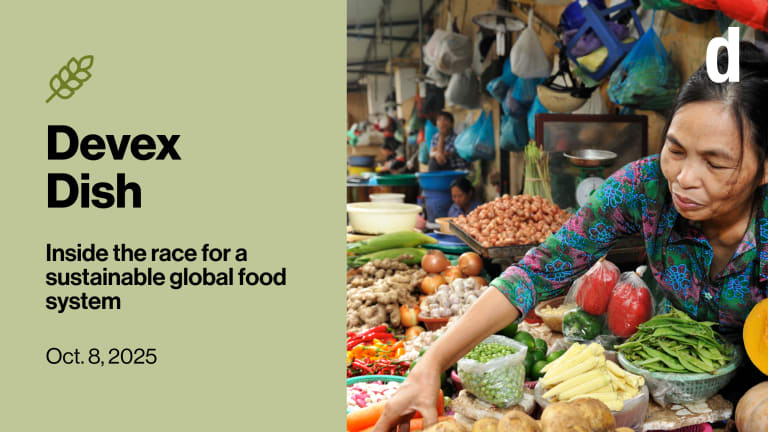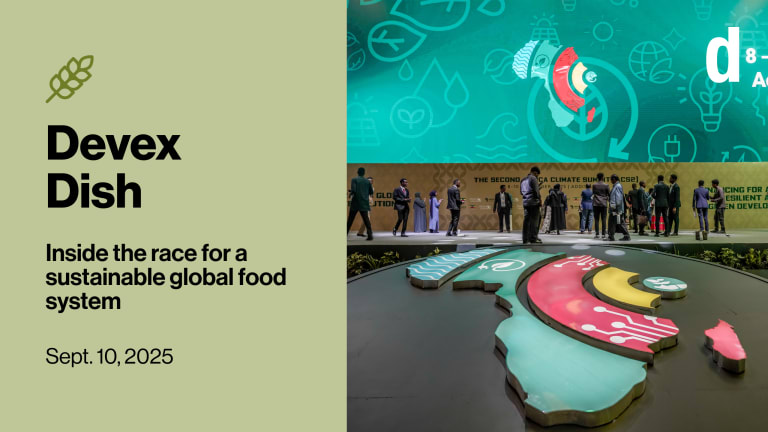Presented by CropLife International

The way Brieuc Pont sees it, investing in nutrition is about much more than “baby bottles and fortifiers.”
“It’s not only that,” says the secretary-general of the Nutrition for Growth, or N4G, Summit. “It’s gender, it’s climate, it’s crisis resilience, it’s social protection and health. It’s innovation, it’s finance.” With four months to go until the big event, he’s trying to get the rest of the world onboard with that vision.
N4G is held every four years in the same country that hosts the Olympic and Paralympic Games. The Paris summit is set for March 27-28, 2025. It follows a 2021 event in Tokyo that raised more than $27 billion in financing. Of course, that was before the global downturn in donor activity and the conflicts in Ukraine and Gaza.
But Pont, a diplomat who was previously France’s ambassador to Nicaragua, is doing his best to convince stakeholders that it’s worthwhile to invest.
“When you plant $100 million in nutrition-specific or -sensitive development policies, you get $2.3 billion in returns — that is wealth that can be redistributed or reinvested,” he tells Devex Senior Editor Tania Karas in a wide-ranging interview. Yet only 1% of official development aid is nutrition-specific. “So there is the challenge to get back to that issue, to make governments and donors aware that it works.” Pont is especially hopeful that the cost-effectiveness pitch will appeal to development banks.
“Nutrition-driven policies are so wide that nutrition itself feels a bit … restrictive. Perhaps we should name it differently. Perhaps we should name it ‘super development’ through nutrition, given its incredible impact, its potential.”
He’s also open to talking to corporations, despite some hesitance in the nutrition sector to engage big food companies. Pont says there are obvious red lines: N4G won’t be looking for contributions from companies producing weapons, alcohol or cigarettes, or those that aggressively market breastmilk substitutes.
“But that doesn’t mean we can't talk to the private sector,” he says. “There are two ways to work. You can work according to your dreams and take decisions as if you were living in a dream world. In that case, when you wake up, it’s going to be a sort of hard landing. Or you can try to look at the world as it is and take decisions accordingly.”
As he scrambles to get his first commitments, Pont tells Tania some good has already come out of N4G. He’s changed the way he shops for food and is much more aware of nutritional labels: “Since I've started in this mission, I’ve lost 20 pounds.”
Read: This French diplomat thinks nutrition is a ‘magic wand’ for development (Pro)
ICYMI, Pont’s opinion piece: Investing in nutrition is investing in a more resilient world
See also: 5 ways to accelerate momentum for the Paris nutrition summit
+ Not yet a Devex Pro member? Start your 15-day free trial today to access all our expert analyses, insider insights, funding data, exclusive events, and more. Check out all the exclusive content available to you.
Meanwhile in Riyadh
It will cost $1 billion per day between now and 2030, or a total of $2.6 trillion over that period, to save the world’s productive land from degradation and to battle drought.
That’s the price tag put forward by Ibrahim Thiaw, the executive secretary of the United Nations Convention to Combat Desertification, which launched its 16th Conference of the Parties, or COP16, this week in Riyadh, Saudi Arabia. Thiaw has warned that without urgent action, droughts will become more common, jeopardizing people’s food sources, reports Devex contributor David Njagi, who is in Riyadh.
Thiaw is hopeful COP16 will draw pledges to help meet the gargantuan goal. Saudi Arabia, the COP16 host, has already pledged $150 million over the next 10 years to support the initiative. Officials expect the funds to help battle droughts by creating early warning systems and boosting the capacity of farmers through agricultural innovation.
The OPEC Fund for International Development and the Islamic Development Bank have pledged $1 billion each, hoping to build resilience against drought by reducing dependence on humanitarian aid.
That still falls well short of the $2.6 trillion goal. And there are also questions about how effective those funds will be if they are not paired with efforts to phase out fossil fuels or to reduce subsidies to the agrifood sector, which is responsible for one-third of global greenhouse gases.
There is also a need to reach legal agreements on land restoration that are critical to the success of COP16 but exist outside of funding pledges.
Background: COP16 desertification summit to target private sector’s overuse of land
ICYMI: ‘These are not infinite resources’ — a conversation with Ibrahim Thiaw
Back, back, back again
The U.S. farm bill is back — well, not really the farm bill, but Washington, D.C.’s anxiety around it.
The $1.5 trillion piece of legislation was supposed to be reauthorized last year. But today, many of the programs funded by that legislation are operating on a temporary extension — including the United States’ flagship food assistance program, Food for Peace.
Now, there are two bills on the table: One approved by the Republican-led House of Representatives’ Agriculture Committee earlier this year, and another released last month by Democratic Sen. Debbie Stabenow, who chairs the Senate’s Agriculture, Nutrition, and Forestry Committee.
“We did see some of the things in the Senate version that would really provide some greater and needed flexibility, whereas the House version risks reducing the effectiveness of food assistance,” Katy Crosby, Mercy Corps’ senior director of U.S. policy of advocacy, tells Devex’s Elissa Miolene.
The House bill has been blasted by those in the aid sector, who say the legislation will place steep restrictions on U.S. food aid across the world. But Stabenow’s bill — which was published just over a month before the current farm bill was set to expire once again — is largely being viewed as a last-ditch effort, one that has little chance of making it through Congress after being rejected by House Republicans late last month.
That leaves two options: A final agreement on the farm bill, or another short-term extension, the latter of which would be passed to a somewhat shuffled Congress under the incoming Trump administration. On Monday, a group of Republican governors urged lawmakers against extending the old farm bill, stating it is “outdated” and leaves American farmers “operating under a framework that is no longer viable.” Instead, they are pushing for a new one — and a break from the 2018 version.
“Reauthorization of a Farm Bill and immediate assistance in the interim will allow farmers and ranchers to do what they do best — provide for America and feed the world,” wrote governors from Georgia, South Carolina, Ohio, and 14 other states.
“The December deadline is definitely looming,” says Crosby. “But this kind of incremental, kicking the can down the road [approach] ultimately doesn’t benefit anyone.”
Background: US House advances farm bill that could strip food aid from 2.3 million
The beauty of dirt
Happy World Soil Day in advance! Tomorrow’s U.N.-designated day is an opportunity to consider all of the benefits we derive from soil, including 95% of our food and 15 of the 18 naturally occurring chemical elements essential to plants.
The need to protect soil takes on more urgency with climate change and human activity doing increasing harm to the earth. The statistics are stark: 33% of the world’s soils are already degraded and over 90% could face degradation by 2050 if action isn’t taken.
And this has direct links to climate: Healthy soil acts as a carbon sink, capturing greenhouse gases and mitigating climate change. In contrast, degraded soils release carbon back into the atmosphere, exacerbating global warming. Resilient soils also bolster food security by helping crops withstand extreme weather. And, on a fundamental level, if soil is not healthy, it’s not going to produce nutritious food.
That explains why soil consistently came up during conversations about sustainable and regenerative agriculture at the recent U.N. Climate Change Conference in Azerbaijan, according to Devex reporter Ayenat Mersie. Advocates there, including Anand Ethirajalu of the Save Soil Movement, underscored the urgent need to prioritize soil health in climate discussions.
For its part, the Food and Agriculture Organization is calling for people to exercise sustainable soil management, including crop rotation, adding organic matter, and using crops that cover the soil to prevent erosion and improve fertility.
Related: COP29 recap — Big promises, small Band-Aids, and Big Oil drama
Background reading: Why soil is the fundamental building block of food security (Pro)
Bringing home the bacon
Your next job?
Grantwriter
Sustainable Agriculture Network
United Kingdom | United States | Western Europe | Eastern Europe (Remote)
Chew on this
Food availability in Gaza is now at an all-time low leading to an expert assessment that the entire region is at risk of famine from now through at least April 2025. [FAO]
An investigation shows how Israel appeared to target aid agencies attempting to deliver critical food aid to people facing malnutrition and famine in northern Gaza [The New Humanitarian]
Barbados has completed a debt-for-climate swap that will allow it to finance sewage and water projects that help make the country resilient to climate change, including financing a water reclamation facility that can be used for agricultural irrigation and groundwater recharge. [Inter-American Development Bank]
David Njagi, Elissa Miolene, and Ayenat Mersie contributed to this edition of Devex Dish.








